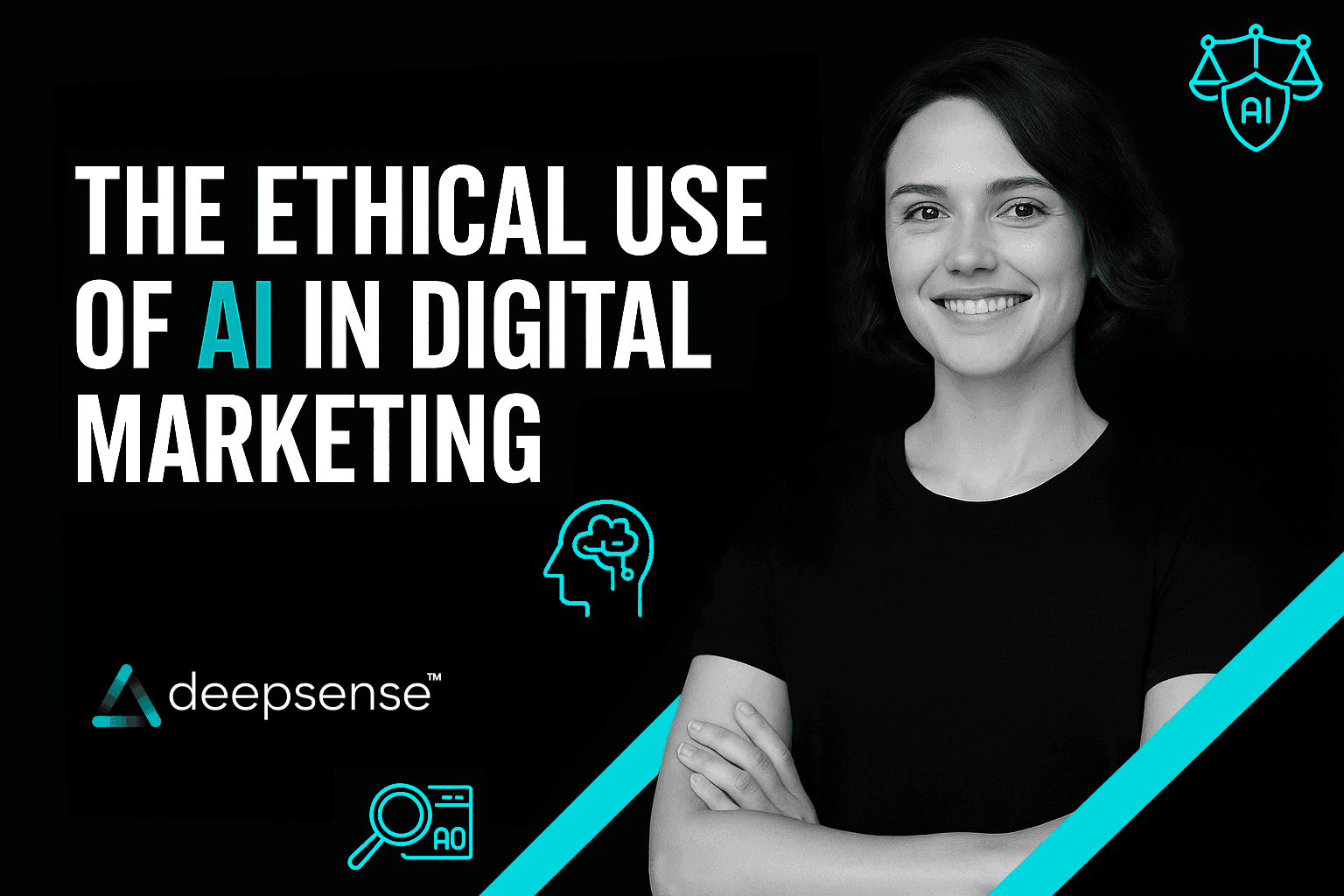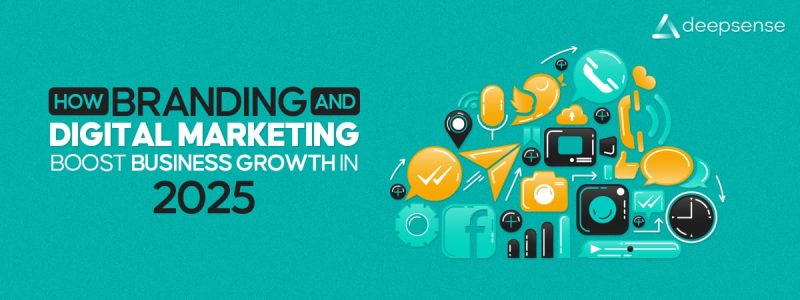Introduction
Artificial Intelligence isn’t just a buzzword anymore, it’s the engine quietly running behind some of the most successful AI in digital marketing campaigns today. From hyper-personalized email recommendations to predictive analytics, AI has redefined how businesses understand, engage, and retain their customers.
But here’s the catch: with great power comes great responsibility.
According to a 2024 PwC survey, 73% of consumers are more likely to trust a brand if they know how their data is being used transparently. Yet, nearly 60% of marketers admit to struggling with balancing personalization and privacy (Salesforce, 2024). This delicate balance is where ethics steps in.
Think about it, customers today aren’t just buying products; they’re buying into values. They want brands that respect their privacy, stay transparent about AI-driven decisions, and use technology responsibly rather than manipulatively. For small businesses and large enterprises alike, this ethical compass isn’t just about doing the right thing, it’s about staying competitive in a market where trust is the new currency.
In this blog, we’ll explore how businesses can harness the power of AI while ensuring ethical practices are front and center. From data privacy to reducing bias and ensuring transparency, you’ll learn not just the “how” but also the “why” of using AI responsibly in your digital marketing strategy.
Why Ethics in AI-Driven Marketing Matters
Imagine you’re scrolling Instagram and see an ad for shoes you merely thought about buying yesterday. Creepy? Or helpful?
AI-driven marketing thrives on data. It knows what you like, when you’re likely to shop, and sometimes even how you’re feeling. While this is powerful, it walks a fine line: overstep, and brands risk alienating customers.
Here are some stats worth noting:
- 81% of consumers say the way a company treats their data directly impacts their trust (Cisco Consumer Privacy Survey, 2022).
- 77% of people prefer brands that are transparent about how AI tools are used (PwC).
- Misusing AI-driven targeting can lead to fines, GDPR penalties, for example, have already exceeded €4 billion since 2018.
So, the ethical use of AI isn’t just a nice-to-have, it’s crucial for long-term brand trust and survival.
5 Key Ethical Principles of AI in Digital Marketing
1. Data Privacy & Consent
AI relies on personal data, browsing history, purchase patterns, location tracking. But brands must handle this responsibly. Consumers want personalization, but not at the expense of feeling watched.
Solution: Always seek consent, anonymize sensitive data, and comply with frameworks like GDPR and India’s Digital Personal Data Protection Act (2023).
2. Transparency in AI Usage
Consumers want to know when they’re interacting with a bot versus a human. AI-generated emails or chat responses that mimic human tone should come with disclosure.
Pro Tip: Brands that openly share how AI is used (e.g., “This recommendation is powered by AI”) build stronger trust.
3. Fairness & Bias Mitigation
AI models are only as good as the data they’re trained on. If the data is biased, so will be the results. For instance, an AI recruiting tool famously favored male candidates because it was trained on historically biased data.
In marketing, this could mean certain audiences being excluded from campaigns. Ethical marketers should regularly audit AI tools for bias.
4. Avoiding Manipulation
Yes, AI can predict emotions and behaviors. But should it be used to exploit consumer vulnerabilities? For example, showing payday loan ads to financially struggling groups is manipulative.
Golden Rule: AI should empower consumers to make better decisions, not trick them into ones they’ll regret.
5. Accountability & Human Oversight
AI should augment, not replace, human judgment. A campaign run fully on autopilot may deliver results but miss context, empathy, or ethical considerations.
Keep a human in the loop to oversee campaigns and correct AI misfires.
How Brands Are Practicing Ethical AI Marketing (Real-World Examples)
- Sephora uses AI chatbots for beauty recommendations but makes it clear that suggestions come from an AI system. Transparency, check.
- Spotify leverages AI for hyper-personalized playlists but doesn’t intrude on private messages or conversations. Boundaries, respected.
- Patagonia, known for ethical branding, avoids manipulative AI-driven retargeting. Instead, they use AI to recommend sustainable purchases.
These brands prove that ethics and profitability can coexist.
The Business Case for Ethical AI
Let’s be real, ethics aside, responsible AI just makes good business sense.
- Companies that prioritize ethical AI enjoy 20% higher customer trust levels (Deloitte, 2023).
- 72% of consumers are more likely to buy from brands that are transparent about AI use (Capgemini).
- Ethical AI use reduces legal and reputational risks, which can cost companies millions in fines or boycotts.
In other words: ethics = trust = long-term ROI.
How Small Businesses Can Use AI Responsibly
You don’t need a Fortune 500 budget to practice ethical AI marketing. Even small businesses can:
- Use AI tools (like HubSpot or Mailchimp) but stay transparent about automation.
- Collect only the data you need—no hoarding.
- Give customers opt-in/opt-out choices.
- Regularly review AI campaigns for biases or over-targeting.
- Pair AI efficiency with human storytelling and empathy.
Conclusion
AI in digital marketing is like fire, transformative when handled with care, but destructive if left unchecked. The question is no longer whether businesses should use AI (that’s a given), but how they can use it responsibly to create meaningful, long-term relationships with customers.
Ethical AI isn’t about restricting innovation, it’s about unlocking sustainable growth. A study by Deloitte revealed that 62% of high-growth companies already embed ethics into their AI strategies, and they outperform competitors who treat it as an afterthought. In fact, businesses that prioritize ethical AI practices report 30% higher customer loyalty and retention rates compared to those that don’t.
At the end of the day, your customers are more than data points; they’re humans seeking connection, trust, and authenticity. By committing to transparency, fairness, and accountability, businesses can not only avoid pitfalls like mistrust and reputational damage but also gain a competitive edge in the market.
So, whether you’re a startup experimenting with AI-driven ad targeting or a global enterprise leveraging predictive analytics, remember: ethical AI is not optional, it’s the future of digital marketing.
FAQ
1. What does “ethical AI in digital marketing” really mean?
Ethical AI in marketing means using AI tools responsibly, ensuring transparency, protecting user data, avoiding manipulative practices, and creating genuine value for customers rather than exploiting them.
2. Why is ethical AI important in marketing today?
Because 86% of consumers say data privacy is a growing concern (PwC). Misusing AI erodes trust, damages brand reputation, and can even lead to legal troubles under data protection laws like GDPR.
3. How can small businesses ensure they are using AI ethically?
By choosing AI tools that are GDPR-compliant, being transparent about data collection, avoiding manipulative personalization, and regularly auditing their AI systems for bias.
4. Does AI personalization cross ethical boundaries?
It depends. Personalization is ethical when it adds value (e.g., showing relevant product recommendations). It becomes unethical when it manipulates users into impulsive decisions or uses sensitive data without consent.
5. How does bias occur in AI-driven marketing?
Bias comes from the data AI is trained on. For example, if past campaigns favored a certain demographic, AI may unintentionally exclude or stereotype groups. Regular human oversight and diverse datasets are key to preventing this.
6. What role does transparency play in ethical AI marketing?
Transparency builds trust. Marketers should openly communicate when AI is being used, whether in chatbots, recommendation engines, or ads, so customers don’t feel misled.
7. Can AI in marketing ever fully replace human creativity?
No. AI can optimize, analyze, and automate, but human creativity and emotional intelligence are irreplaceable. The best results come when AI supports human marketers, not replaces them.
8. Are there regulations around AI in marketing?
Yes. Laws like GDPR in Europe, CCPA in California, and the upcoming EU AI Act set clear rules about data use, algorithmic accountability, and consumer rights. Businesses must stay compliant.
9. What are some examples of ethical AI use in marketing?
- Using AI to reduce ad waste and show only relevant ads.
- Personalizing customer journeys based on consented data.
- Chatbots that disclose they’re AI-powered.
- Sentiment analysis to improve customer support (not to manipulate).
10. How does ethical AI give businesses a competitive advantage?
Consumers prefer brands they can trust. According to Edelman Trust Barometer (2024), 71% of people say they’re more likely to buy from a company they trust with their data. Ethical AI practices not only avoid risks but also build long-term loyalty and stronger customer relationships.











